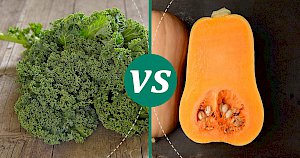Butternut Squash vs Kale: Nutrition & Calories Compare


Butternut squash vs Kale
Nutrition Facts
Serving size:
change
5g10g15g20g30g40g50g60g80g100g120g140g160g180g200g220g250g300g350g400g450g500g600g700g800g900g1000g
1oz2oz3oz4oz5oz6oz7oz8oz10oz12oz15oz20oz25oz30oz35oz40oz50oz
Amount Per Serving:
Serving size:
change
5g10g15g20g30g40g50g60g80g100g120g140g160g180g200g220g250g300g350g400g450g500g600g700g800g900g1000g
1oz2oz3oz4oz5oz6oz7oz8oz10oz12oz15oz20oz25oz30oz35oz40oz50oz
Amount Per Serving:
Butternut Squash vs Kale 100g Compare
| per 100g | Butternut squash | Kale |
|---|---|---|
| Calories | 45 | 49 |
| Carbohydrates | 11.69 g | 8.75 g |
| Fat | 0.1 g | 0.93 g |
| Dietary fiber | 2 g | 3.6 g |
| Protein | 1 g | 4.28 g |
| Calcium | 48 mg | 150 mg |
| Iron | 0.7 mg | 1.47 mg |
| Magnessium | 34 mg | 47 mg |
| Phosphorus | 33 mg | 92 mg |
| Potassium | 352 mg | 491 mg |
| Sodium | 4 mg | 38 mg |
| Zink | 0.15 mg | 0.56 mg |
| Vitaminium A | 10630 µg | 9990 µg |
| Vitaminium B1 (Thiamine) | 0.1 mg | 0.11 mg |
| Vitaminium B2 (riboflavin) | 0.02 mg | 0.13 mg |
| Vitaminium B3 (Niacin) | 1.2 mg | 1 mg |
| Vitaminium B5 | 0.4 mg | 0.091 mg |
| Vitaminium B6 | 0.154 mg | 0.271 mg |
| Vitaminium B9 (Folic acid) | 27 mg | 141 mg |
| Vitaminium C | 21 mg | 120 mg |
| Vitaminium K | 1.1 µg | 704.8 µg |
| Beta karoten | 4226 mg | 5927 mg |
Butternut Squash vs Kale: A Nutritional Showdown
When it comes to filling your plate with vibrant, nutrient-dense vegetables, butternut squash and kale stand out for their health benefits and culinary versatility. Butternut squash, with its sweet, nutty flavor, is a fall and winter staple. On the other hand, kale, a leafy green powerhouse, has been celebrated for its nutritional value and has become synonymous with health and wellness. Both have their unique sets of benefits, but how do they compare when placed side by side in terms of nutrition?
Calories and Macronutrients
At first glance, butternut squash and kale are quite similar in calories, with butternut squash having 45 calories per 100 grams and kale slightly higher at 49 calories. However, their macronutrient profiles tell a different story. Butternut squash is higher in carbohydrates, boasting 11.69 grams compared to kale's 8.75 grams, making it a better source of energy. Kale, however, takes the lead in protein content with 4.28 grams, significantly more than butternut squash's 1 gram. In terms of dietary fiber, kale also surpasses butternut squash, offering 3.6 grams versus butternut squash's 2 grams.
Vitamins and Minerals
Both vegetables are champions when it comes to vitamins and minerals, but they shine in different areas. Butternut squash is an excellent source of vitamin A, providing 10630 IU, slightly more than kale's 9990 IU. However, kale far exceeds butternut squash in vitamin C, with a whopping 120 mg compared to butternut squash's 21 mg. Kale also boasts a superior vitamin K content of 704.8 mcg, essential for blood clotting and bone health, dwarfing butternut squash's 1.1 mcg.
When it comes to minerals, kale continues to impress with higher levels of calcium (150 mg), iron (1.47 mg), and magnesium (47 mg). Both vegetables are cholesterol-free and low in fat, making them heart-healthy choices.
Butternut Squash vs Kale: The Verdict
Choosing between butternut squash and kale ultimately depends on your nutritional goals. If you're looking for a low-calorie, high-fiber option with a boost in protein, kale is your go-to. It's also the winner for those seeking to maximize their intake of vitamins C, K, and several minerals. Butternut squash, with its higher carbohydrate content, provides more energy and is an excellent choice for those needing a vitamin A boost.
In the end, both butternut squash and kale offer unique nutritional benefits that can complement any diet. Whether you're roasting butternut squash for a sweet side dish or massaging kale for a vibrant salad, incorporating these vegetables into your meals can contribute to a balanced, healthful eating pattern. So why not enjoy both and reap the diverse benefits they have to offer?
Butternut squash 100g
45kcalCalories source
- 91% CARBS.
- 8% PROTEIN
- 2% FAT
Kale 100g
49kcalCalories source
- 58% CARBS
- 28% PROTEIN
- 14% FAT
Compares of butternut squash
- Butternut Squash vs Artichoke
- Butternut Squash vs Asparagus
- Butternut Squash vs Beetroot
- Butternut Squash vs Calabash
- Butternut Squash vs Broccoli
- Butternut Squash vs Cabbage
- see all compares of butternut squash
Compares of kale
Read also:
- Calories from Butternut squash
- Calories of Cabbage
- Calories in Carrot
- Cassava calories per 100g
- Cauliflower protein per 100g
- How many calories does fodder cabbage have?
- Calories in a half of eggplant
- Calories in whole eggplant
- Calories for one, two or more eggplants
- Calories in slice of eggplant
- How much protein in endive?
Marcin Piotrowicz
calories-info.com creator
Healthy diet and healthy lifestyle promoter
Add comment